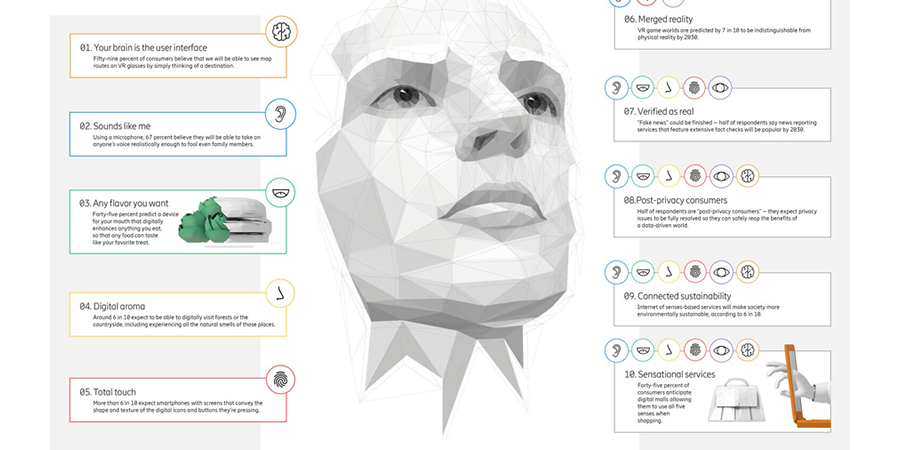Early technology adopter consumers expect the “Internet of Senses” to become a reality by 2030, according to Ericsson’s latest ConsumerLab Hot Consumer Trends report.
The concept involves technology interacting with our senses of sight, sound, taste, smell and touch, enabled by AI, VR/AR, 5G and automation.
The survey of 46 million early technology adopters from 15 cities around the world predicted that over the next decade, screen-based experiences will compete with multisensory ones that will be almost inseparable from reality.
Main drivers for the Internet of Senses include immersive entertainment and online shopping, the climate crisis and the corresponding need to minimize climate impact.
Dr. Michael Björn, Head of Research Agenda, Ericsson Consumer & IndustryLab, and co-author of the report, says: “It could play a significant role in climate action and carbon footprint reduction. Many activities can be digitalized to reduce their climate impact. You could go to work, go on vacation, and travel the world, all from your home.”
Dr. Pernilla Jonsson, Head of Ericsson Consumer & IndustryLab and co-author of the report, says:
“We’re talking about a shift from current smartphone-based internet connectivity to immersive experiences resulting from our senses being connected. This report explores what that could mean for consumers, with Augmented Reality glasses as the entrance point. We did not expect the extent to which consumers already envisage vast changes to our daily lives driven by sensory connectivity through Artificial Intelligence (AI), Virtual Reality (VR), Augmented Reality (AR), 5G and automation.”
The 10 Hot Consumer Trends for 2030 – Internet of Senses are:
- Your brain is the user interface
Fifty-nine percent of consumers believe that we will be able to see map routes on Virtual Reality glasses by simply thinking of a destination.
- Sounds like me
Using a microphone, 67 percent believe they will be able to take on anyone’s voice realistically to fool even family members.
- Any flavor you want
Forty-five percent predict a device for your mouth that digitally enhances anything you eat, so that any food can taste like your favorite treat.
- Digital aroma
Around 6 in 10 expect to be able to digitally visit forests or the countryside, including experiencing all the natural smells of those places.
- Total touch
More than 6 in 10 expect smartphones with screens that convey the shape and texture of the digital icons and buttons they are pressing.
- Merged reality
Virtual Reality game worlds are predicted by 7 in 10 to be indistinguishable from physical reality by 2030.
- Verified as real
“Fake News” could be finished: half of respondents say news reporting services that feature extensive fact checks will be popular by 2030.
- Post-privacy consumers
Half of respondents are “post-privacy consumers”: they expect privacy issues to be fully resolved so they can safely reap the benefits of a data-driven world.
- Connected sustainability
Internet of senses-based services will make society more environmentally sustainable, according to 6 in 10.
- Sensational services
Forty-five percent of consumers anticipate digital malls allowing them to use all five senses when shopping.










